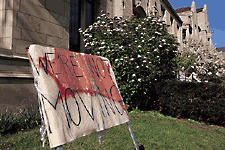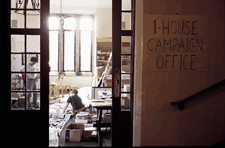Reversal
of I-House fortunes:
Building, programs to stay
 The
Gothic angles of International House stood out against bright
blue skies on May 25,
presenting a picture-postcard view. The blue-skies imagery was
appropriate. In a message to the campus community, President
Hugo F. Sonnenschein had just reversed plans to close the international-
and graduate-student residence on June 30. Instead, while a
$1.8-million fire-alarm system is installed to bring the building
up to code, the public spaces and as many of the residents'
rooms as possible will remain open. Meanwhile, a full-scale
reassessment of I-House will be launched.
The
Gothic angles of International House stood out against bright
blue skies on May 25,
presenting a picture-postcard view. The blue-skies imagery was
appropriate. In a message to the campus community, President
Hugo F. Sonnenschein had just reversed plans to close the international-
and graduate-student residence on June 30. Instead, while a
$1.8-million fire-alarm system is installed to bring the building
up to code, the public spaces and as many of the residents'
rooms as possible will remain open. Meanwhile, a full-scale
reassessment of I-House will be launched.
The March
announcement of I-House's closing ("Chicago Journal," April/00)
was met by waves of dismay, including a letter of protest from
the international-studies faculty, a series of demonstrations
organized by I-House residents, a lawsuit charging that, in
planning to separate the program from the building, the University
was flouting the intent of International House's original donor,
John D. Rockefeller Jr., and a Save I-House fund-raising campaign
(as of May 31, the Save I-House Web site cited $130,000 in gifts
and pledges, including a $100,000 challenge grant).
Responding
to the protests, on March 28 President Sonnenschein announced
the formation of the Committee on the Future of International
House, co-chaired by Richard Franke, a U of C trustee and the
retired chair and CEO of the John Nuveen Company, and Edward
Cook, associate professor in history and secretary of the International
House Board of Governors. Also on the committee were five other
professors; two graduate students (and I-House residents); University
trustee Paula J. Wolff, AM'69, PhD'72; and Stanley D. Christianson,
MBA'60, president of the International House Board of Governors.
Asked to report their findings by May 31, the committee interviewed
nearly 100 members of the campus community and made its way
through several hundred e-mails and letters. Finishing ahead
of schedule, they presented their recommendations on May 24.
The next
day, Sonnenschein pledged to take steps in accord with all of
the committee's recommendations. Not only would I-House remain
open past June 30, but the University would also "reconstitute
and strengthen the International House Board, appoint a new,
full-time director of International House, assume the management
of the International House building and financial planning,
and initiate a process to plan for the future of the International
House building." Also in accordance with the recommendations,
Sonnenschein announced that the University would embark on a
"comprehensive study of international education at the University
of Chicago in the 21st century."
 |
| The
I-House lawn sports
a a billboard. |
As the
committee noted, the planned mothballing had united a number
of campus and community groups around a number of issues: "…aging
facilities, the growth of programs, the changes within international
studies, the impact of globalization, and changes in the Hyde
Park real-estate market." Recognizing that "as often is the
case with such matters, no one involved had a complete view
of the issues," the committee focused on providing an accurate
snapshot, one that would show where more detailed study is needed.
One area
for study is the building itself. Calling I-House's building
"particularly well suited to its mission," the report noted
that while it is not the U of C's most distinguished example
of the collegiate Gothic style, its placement on the Midway
has made it an instantly recognizable campus icon. Inside, its
common spaces "are a significant resource for the University
as a whole," impossible to replicate.
While the
basic fabric is sound, major systems--plumbing, electrical,
elevators, and roof--are at the end of their useful life. Summarizing
the renovation plans that I-House has considered over the past
decade, the committee called for the planning to begin again.
In thinking about how to reconfigure I-House, the committee
suggested that planners explore the possibility of housing undergrads
in addition to graduate residents as well as short-term visitors.
It also emphasized that many of the building's existing qualities
lend themselves to hosting small conferences.
Not only
is the building basically sound, the committee concluded, but
the University needs the room-and-board space it offers. With
a 1-percent vacancy rate in the Hyde Park rental market, it
would be hard for several hundred suddenly displaced students
to find space locally and almost impossible for graduate students
who want to live alone to find housing at comparable prices.
In addition, a lack of guest accommodations near campus has
meant that I-House provides approximately 15,000 nights of visitor
housing each year. Many of the stays are connected to University
business.
Despite
the tight rental market, it's true that I-House is not at full
occupancy (just over 500 residents). The committee traced the
declining numbers (fall enrollment of 335 residents, a figure
that has held steady for three years) to several factors. In
the mid-1980s, 40 percent of I-House residents were GSB students,
but as the GSB shifted to older students with more work experience,
fewer wanted a dorm-like living situation. In addition, many
American students want more personal space than offered in I-House's
small rooms. Last but not least, the mid-1990s introduction
of a more expensive food plan (now replaced by an experimental,
voluntary program) proved vastly unpopular.
 |
| Room
with a view: I-House
residents turned the former gift shop into headquarters
for the Save I-House campaign. |
Even at
less than full occupancy, the report noted, I-House performs
an important service. Most residents are first-year graduate
students (in physical or social sciences, or the humanities)
whose home is outside the U.S. Up to 25 percent of international
graduate students live for a time at I-House. While only 5 percent
remain on after their first year--many find friends and move
into apartments--the committee found that "the social matrix
created by living in I-House, even though it may be for only
the first year of a student's program, creates bonds that extend
beyond the narrow compass of degree work."
Yet the
committee acknowledged that it had heard little "about how I-House
fits into the University's international programs or its intellectual
mission. Currently it is not clear that there is a very close
fit at all in either regard. If considerable resources are to
be devoted to a renovation of I-House, which will in turn involve
a major commitment from the University administration, from
the Development Office, and from supporters of the University,
this will have to be seen as desirable on intellectual and programmatic
grounds by important constituencies within the University."
Recommending a separate, comprehensive study of international
education at the U of C, the report said such a study should
include I-House and its role.
Just as
International House should be more closely tied to the University's
intellectual programs and goals, the committee argued, so it
should be more effectively integrated into the University's
day-to-day management, following models more closely analogous
to those of other University boards, such as those for the Smart
Museum or Court Theatre, both of which are effective fund-raisers.
With a
June 30, 1999, endowment of $8.4 million and a 1998-99 operating
surplus of $258,000, International House received only $156,000
in gifts last year. To make fund-raising a priority, the committee
suggested, I-House's current board should be reconstituted to
in-clude more high-profile political or business leaders, including
international members and U.S. members outside Chicago, with
a capacity to raise money. As fund-raising--both for capital
purposes and programming--is made a board priority, the role
of the I-House director or president would also change. The
report recommends the hiring of a full-time professional director
to manage the programs, oversee fund-raising, and make I-House
a resource for the City of Chicago.
Moving
the building management and financial planning under the University
umbrella, the committee said, would underscore the House's significant
role as a graduate-student residence, clarify the University's
relationship to I-House, and properly maintain the building,
thus avoiding a repeat of the problems that helped spark this
spring's controversy.
In calling
for such integration, the committee sounded a cautionary note:
"[I]t is neither desirable nor realistic to expect I-House to
become the central element in the international programs, no
matter how symbolic its presence is for many people."
Within
a week of the report's publication and the president's response,
the Save I-House Web site had posted an open letter to Hugo
Sonnenschein, thanking him for responding to the recommendations
"so promptly and constructively." While in agreement with the
gist of the report, the letter also emphasized its writers'
belief in the necessity of maintaining I-House's autonomy: "We
firmly believe that it would be wise to make every effort to
pattern the governing structure of our International House after
the successful and well-tested models of its sister institutions,
International Houses of New York and Berkeley. These Houses
contribute greatly to the local universities, while retaining
their freedom to fulfill their own mission."
Incoming
U of C President Don M. Randel, with whom Sonnenschein conferred
about the report, will appoint the new international-education
committee. He told the Chicago Maroon, "We all want the programs
of International House to flourish. Now it is clearer how we
might go about that."--M.R.Y.

![]()
 The
Gothic angles of International House stood out against bright
blue skies on May 25,
presenting a picture-postcard view. The blue-skies imagery was
appropriate. In a message to the campus community, President
Hugo F. Sonnenschein had just reversed plans to close the international-
and graduate-student residence on June 30. Instead, while a
$1.8-million fire-alarm system is installed to bring the building
up to code, the public spaces and as many of the residents'
rooms as possible will remain open. Meanwhile, a full-scale
reassessment of I-House will be launched.
The
Gothic angles of International House stood out against bright
blue skies on May 25,
presenting a picture-postcard view. The blue-skies imagery was
appropriate. In a message to the campus community, President
Hugo F. Sonnenschein had just reversed plans to close the international-
and graduate-student residence on June 30. Instead, while a
$1.8-million fire-alarm system is installed to bring the building
up to code, the public spaces and as many of the residents'
rooms as possible will remain open. Meanwhile, a full-scale
reassessment of I-House will be launched. 
